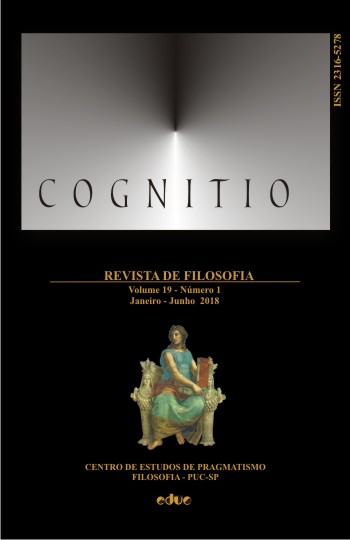Imaginação criativa e criatividade
DOI:
https://doi.org/10.23925/2316-5278.2018v19i1p77-87Palavras-chave:
Criatividade, Dewey, Imaginação, Inovação, Níveis de criatividade, Weisberg.Resumo
Nas últimas décadas, a ideia de criatividade tem obtido um aumento de interesse nos campos da filosofia, ciências cognitivas, sociologia, etc. e tem havido uma contribuição renovada com relação à ideia clássica de criatividade. Consideramos que a contribuição do pragmatismo clássico merece uma menção especial – em especial, as obras de Charles S. Peirce e John Dewey. Neste artigo, iremos nos referir, exclusivamente, ao tratamento deweyiano a essa ideia. Sustentaremos que a teoria de Dewey fornece elementos interpretativos que são inovadores e disruptivos com relação à tradição filosófica, inclusive, uma nova concepção de imaginação criativa. Exporemos algumas consequências de sua posição – como nós a interpretamos. Com efeito, sustentaremos que Dewey afasta-se das demandas clássicas para as quais um produto criativo envolve, necessariamente, uma transformação radical da vida humana, segundo a ideia de níveis de criatividade; essa teoria deweyiana constitui um insight interessante para a promoção da atitude criativa; esse processo criativo preserva a mesma estrutura em todos os casos – ciência e arte, por exemplo – e essa criatividade é, agora, uma potencialidade intrínseca dos seres humanos – a qual pode ser realizada ou não. Por fim, consideramos a relevância de alguma tese deweyiana para as posições atuais, como no caso do psicólogo cognitivo Robert Weisberg, enfatizando as coincidências e desacordos de ambos.Downloads
Publicado
2018-09-06
Como Citar
Di Gregori, M. C. (2018). Imaginação criativa e criatividade. Cognitio: Revista De Filosofia, 19(1), 77–87. https://doi.org/10.23925/2316-5278.2018v19i1p77-87
Edição
Seção
Artigos Cognitio









